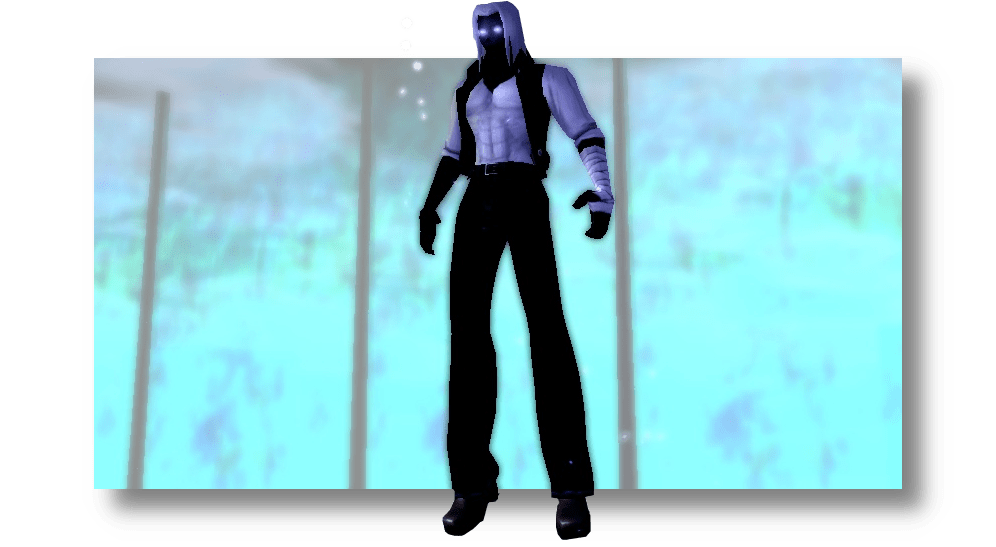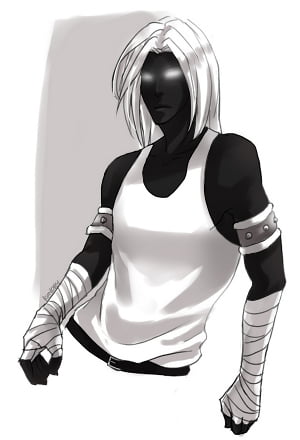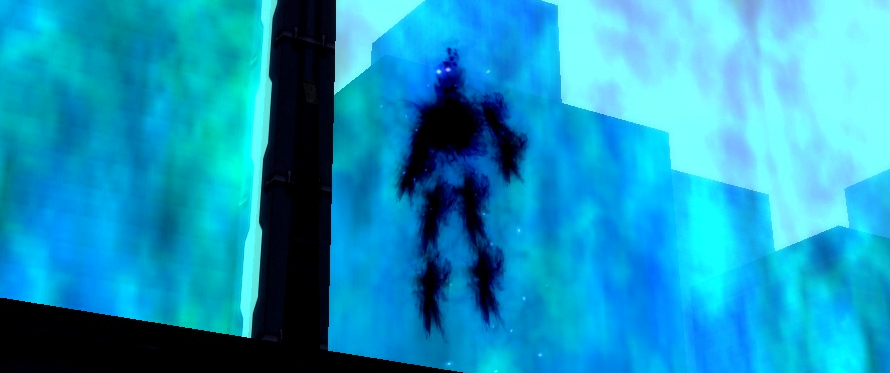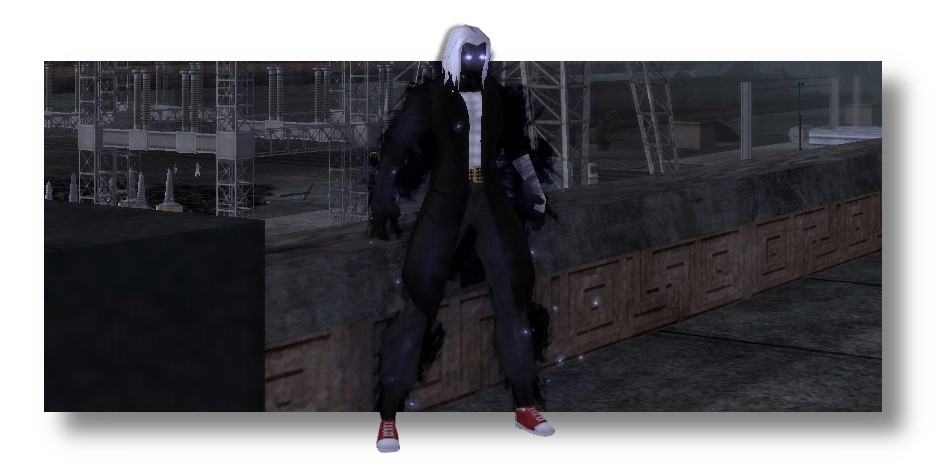Time to time, I write up an explication of characters I’ve played in RPGs or made for my own purpose. This is an exercise in character building and creative writing.
In this case, this character’s backstory requires some Content Warning for parental abuse, and themes of mental health and trauma, as well as uh, Death Gods?

The vitals; Poor and poorer for it. Born in Croatoa. Raised in Kings. Single father. Bad father. Empathy powers, started in high school. Got hurt. Got insular. Had to deal with his feelings, and everyone else’s feelings.
Then Mot happened, and he had to deal with nothing but Mot’s feelings.
Carcer, only name given, has done some dumb things to try and deal with his situation. Ink black skin, a death god’s powers, the damage persisted after the sealing of Mot. A damaged, surly, aggressive boy, he’s been trying to use what he’s got to do some good.
Carcer is a member of the Protectorate, a character with edgy, apocalyptic doom-themed powers and an unwavering moral code about doing what’s right. In a world of capes and cloaks, he knows he lives in the shadows outside, a black ghost, a lovecraftian horror that walks on two feet.
Carcer is a dark silhouette, a grumbly, low-voiced character who is connected, in some general way, to death. He refuses to kill anyone – and he has made a point of interrupting others who would commit murder (though, crucially, not judging all murderers). There’s a rowdiness to him, a low-key criminality. In a community of high-profile heroes with money and contacts in business, Carcer is the guy who knows the criminal elements, stalking dark streets and keeping an eye on things. Often, when Carcer is asked what he’s up to, he’ll say something like cult shit, or describe taking some artifact from the 5th Column, because he’ll take any opportunity to fight his way into Nazi camps.
Carcer likes fighting Nazis.

As for what Carcer can do, he’s comparable in some ways to a group’s Batman. Not the idea of this billionaire who can solve problems in every way, but rather, the spooky guy who always knows something.
As an individual, Carcer is a real powerhouse of a character whose power doesn’t reach far beyond himself. As an all-round spooky guy, he can talk to ghosts, interact with the dead, terrorise things that approach him, even robots and the undead, and even reach into people’s dreams if he’s holding contact with them. Some locations Carcer haunts, and the result is that he can seemingly just turn up there, without any good explanation, something that he does not understand and can’t do consciously. This is without touching on the fact he’s holding a death god’s powers in his hands.
Carcer can’t die. Carcer is extraordinarily hard to hurt and has a level of pain tolerance that beggears belief – this is tied to his empathy. When he punches someone, he feels the pain he inflicts. As a fighter, Carcer is probably the best boxer the hypothetical you will ever meet. What’s more, because a number of objects and immaterial things he deals with can ‘end’ or ‘die,’ he can often punch through them.
Carcer is typically a character you put in front of an army to subdue it, so the rest of the group can get on with dealing with the more complicated, more interesting problem the army is coming to stop.
Mechanics
Carceri has been many things in his long(?) existence. He’s been a Dominator, a Scrapper, a Brute, and now, a Tanker. The tanker version is the most recent revision, and was done as a sort of ‘end point’ for the character – rather than a choice made to fit a build I already had in place or something I felt I could use conveniently.
I revamped him most recently after talking with friends about what made up Carcer. Like, what Carcer identity looked like. What did you know about what Carcer could do? Well, he punched things, and he didn’t die. The toughest character archetype seemed appropriate then – and the rest of the build flowed in from that.
As a Dark armour/Dark Melee/Soul Mastery Tanker, Carcer is certainly playing to a theme of Dark Dark Darkness. From Soul Mastery, he gets a ranged attack and area attack – think like a fireball – that fit his motif, and from his armour and melee set, he serves as a sort of lethal punchy boxer. As a tanker, he’s tough – and as a heavily built one, he’s extraordinarily tough. Carcer is someone who opens the door first, and gets bloody. This works really well with the kind of person he is – Carcer is the guy who can take a hit, so he refuses to let that push him.
Carcer’s build has some choices that are, technically, ‘suboptimal.’ Particularly, he uses Cloak of Fear instead of Oppressive Gloom. Oppressive Gloom is a stronger power with more general application – the tohit penalty from Cloak of Fear is resisted by most things he fights, and the terror is easily broken thanks to his damage aura. I chose Cloak of Fear because the aesthetic of it is to surround him with a cloud of horrible screaming ghosts, which is very him.
While I don’t have the historical builds on hand, I do have his current Tanker build. As a major character in my roster, I did spend a little more money than I normally do on Carcer’s build. The build has:
- Soft-capped Smashing, Lethal and Melee defense
- Soft-capped Fire and Cold defense
- Almost-capped resistance to Psionics
- Capped resistance to Smashing and Lethal
- HIgh resistance to fire, cold, and negative energy damage
- Enough endurance and recovery to attack constantly
- Permanent hasten with incarnate powers
- The ability to recover 100% of his health every 9 seconds
- A nice smooth attack chain with a lot of high-damage attacks
- AOE damage chains and AOE taunt controls to pull in enemies
You can download it here.
There’s also another element about Carcer that matters a lot to me. It’s his voice – he’s represented in text media, and when I do that, it’s an important detail that Carcer never uses capitals in his speech. In the game, when Mot speaks, it has UNEVen capiTAliSaTIon WHicH is usED to rEpRESent a voice WIth UNsetTling EmpHASIs. By contrast, Carcer’s voice is always controlled, always lower, kept down in a rumble that makes him seem a little odd.
History
There’s two forms of history here. First is Carcer’s story, in the universe; how he came to his powers, and how he came to be named the way he is.
Carcer started out an ordinary kid, with a different name. He was born in Salamanca to a farmer and his wife. The boy now knows very little about his mother, but that she left. This is something he has strange feelings about – he understands that he should probably resent her, or miss her, but he doesn’t. After she left, the son was the focus of his father, who was a violent man with low self esteem. When his son disappointed him, he hit him; when he was drunk, he hit him; when he was a problem, he hit him.
Eventually the farm failed – because the man running it couldn’t keep up the task on his own with only his son for help. He moved the pair to Kings Row, where his son started attending public school. As a former farmboy, he didn’t have a lot of social experience, but he did have a lot of physical brawn, resulting in him getting into fights. His father’s problems worsened and he took them out on his kid. The kid sought to escape that experience, by doing odd jobs, getting involved in minor crimes, and hanging around at the boxing gyms around Kings Row.
Then when he was a teenager, the son’s mutation kicked in. He was an empath – someone who could feel the feelings of people around him. This was disastrous. A public school full of poor kids and underfunded teachers was full of secrets and pain, and he was suddenly feeling all of it. It made it even harder to maintain friendships, as suddenly this kid was aware of people lying to him, aware of their pains and stresses and tried to help in awkward, miserable ways. Eventually he ditched school, unable to handle the experience of being surrounded by alienating people and his own pain, and stopped returning to his father’s place, living on the streets.
He found that workplace environments where people were focused and asocial helped. He started working kitchens in the many small eateries across Kings Row, and became very good at it. He worked himself to exhaustion until he passed out every night, and he was, in this situation, coping.
Then, as a point of continuity in the City of Heroes lore, Mot, the death god buried underneath Dark Astoria, woke up, transformed a whole section of the city, and started reaching out to try and recreate the world in his own shape. He lured in cults, he demanded service, he threw ghosts into the world and even reanimated the dread mega-zombie Adamastor to stomp around the city trying to bring about the end of the world.
Suddenly the young empath wasn’t able to hear anyone’s feelings, because of the screaming, immense, background radiation of Mot. The empath’s skin went black as ink, his hair white as snow, and he was surrounded by a ghostly glow of flitting spirits, deaths of tiny ideas. Suddenly this boy who had every reason to feel hard done by, to feel entitled to revenge, to feel his pain was worth sharing with the rest of the world, and at his fingertips, there was the power of the god of death, which would give him everything, if only he was willing to ruin the world.
And he said no.
There was a trial period, of course. He ran away, to the Etoile, to get away from Mot, to see if that stilled the call for murder echoing, echoing, pounding in his head. He even fell in with the Project Destiny type – working for Arachnos momentarily, but crucially, refusing to kill even there, because who can be sure. Eventually he realised he wasn’t getting better, that the sounds weren’t stopping – and Mot was trying even harder to push him to kill in the Etoile.
There was a limited pool of options for him at that point. Inspired by the story of another Arachnos agent, who defected by kidnapping a scientist and surrendering herself to the Longbow forces in Nerva.
Considering his situation, considering what it meant for him going forward, he resolved that he would keep Mot a prisoner inside himself, and went for it.
Longbow captured him; the scientist he captured was a useful asset, but they didn’t trust him, lacking all paperwork and being a marked Destined One. What’s more, when he was asked for his identity, he refused to give his government name, for fear of being returned to his father. And so, Longbow were left with a powerful superhero asset that they could not identify. When asked for his identity, he only told them that he was Carcer – a prison.
That was his fate, for a while; Longbow used him to deploy in missions as shows of good faith and to put his powers to good work. He did the work but was constantly stuck back in a cell. Eventually, though, the Protectorate were one of the organisations they sent him to work for, and they thought he was useful enough, and clearly rankled at imprisonment enough, that they requested him for fulltime transfer.
And that was where Carcer started.

There is a time before this, of course. Back on live, the first time, Carcer had a history, met people, and… well, to be honest, he was treated really badly as a character by the community he was involved in. He was hostile and aggressive when dealing with terrible roleplayers who played awful characters, yes, and I don’t have a problem with that. The Challengers were at the time an example of people who don’t realise that they’re the kind of toxic community people get warned about. Sometimes I think ‘hey, maybe I was over sensitive to this,’ but then I go back, check logs and details and realise that, nope, this would be bad behaviour even now.
But there was also, literally, a race to ‘get’ Carcer, where players talked about planting a flag on him. This meant that his first incarnation was quickly a miserable experience to play, as what he wanted, liked, and wanted to do, was subsumed into supporting other players who were going through Bad Times, and using RP with me as a way to handle it. I don’t forget those players, and I do not mean them any ill will, but I remember, very keenly, just how bad their play made me feel. It was a useful mulligan to take – because I was able to look at Carcer and know what I really wanted out of this character if I ever got a second chance.
To talk about the history of Carcer after joining the Protectorate is difficult, too, because he has been my main link to the group the Protectorate, which I love to bits. That means he has at this point, almost two full years of pretty much weekly roleplay stories. Sometimes it’s a big deal, sometimes it’s a small thing, sometimes he just offers a smartass mention in someone else’s plot, sometimes he’s the link that keeps a villain from falling into darkness.
What we have learned in this time is that Carcer is an extremely romantic boy – feelings are very important to him. He listens to people talk about their feelings, for example. It’s not uncommon to find him in the kitchen at the dorms, preparing food that goes into lunchboxes, for everyone to have, at their leisure.
There’s another thing about Carcer, a phrase that kind of encapsulates the way to approach what he’s going to do, what he’s going to try to do. That is, Everything Carcer Does Is A Flex. Carcer is someone who has felt weak and helpless, who has been made to feel vulnerable, and therefore, everything he tries to do going forward is a demonstration of strength. This isn’t to say everything he does is expressing strength through violence, but rather any time he feels afraid or weak or vulnerable, any time his impulse is to run or hide or protect himself, he steps up and refuses to. Carcer listens to people. He apologises. He refuses to be the person that it would be easy for him to be.
Carcer has helped characters teetering on the edge of death. He’s stood in front of an undead army, as his friends tried to break the control of a manipulative goddess over her ex-lover, and one by one fought off the population of a world that sought to kill her. Carcer has been punched in the face by one of his girlfriends’ extradimensional twin, and punched in the face by that same girlfriend when she was turned into a magical girl bunny. He has fought demons and dragons and at least one he terrified a mecha. There is this ongoing personal canon as he has learned how to ask for help and how to show care. Carcer has gone to another world and Carcer has gone Christmas shopping.
I asked my friends if there are any ‘Carcer moments’ that stand out to them. Any lines of dialogue or quips that set him apart, and oddly enough, none really did. Not that there aren’t moments – it’s that Carcer’s behaviour is so entwined with actions, with demonstrations. He teases and jokes and he grins, from time to time, like a monster. A friend once said that Carcer at first looks like a terrifying beast; then you learn he’s really a nice person; then you learn that he’s both.
If you ask me about a single member of the Protectorate Carcer’s dealt with, I can almost always remember a fun, or interesting incident or reason for how they interact, which is one of those things I fucking love about communal RP spaces like that, something that I think is what I truly missed playing in City of Heroes versus playing in other spaces.

When City of Heroes shut down in 2012, I was left with almost a hundred superhero characters and concepts. Some of them I was okay letting go. Some were primarily about their interaction with other players, and I was okay with letting them slip away between my fingertips. For some of them, I hung onto them, and brought them into new roleplay spaces. Some became D&D characters, some became G4 characters. Some of them were revisited in short stories and books I tried writing. For the most part, the person mattered, the setting didn’t.
Carcer, however, I could never play anywhere but City of Heroes. The character of Mot, and the character of the setting he was from, were just too inextricably linked. The idea of this lovecraftian horror, the idea of a setting full of superheroes that disappointed him even as he believed in the idea of them, they needed to work together. To try and put him anywhere else would involve just recreating him.
The original Carcer was extremely angry. He was angry at the society of heroes around him, including some names that even now stick in my mind as just dreadful characters, written by people who didn’t realise they were being awful humans. He hung around on the social media of heroes who didn’t know how to be heroes – just big, goonish, self-centred drama magnet bullies. He hated them, and demanded they hold themselves to a higher standard, shouting endlessly about how hard could it possibly be to be powerful, and a good person, while he grappled with containing Mot. They did not know his plight, but it also didn’t matter.
The newer Carcer is still angry – he’s still containing a god, and he’s still absolutely enraged about these old identities. Yet, now, thanks to having a really good, fun environment to work with, his rage is less about the heroes around him failing to live up to basic moral standards. It’s instead directed at the world around him for not being fair – for not giving the people around him the safety and dignity they deserve.
Carcer is something I wouldn’t have, if the game had not given me a platform to have him, and I would not love, if not for the people who have become part of his story. I am so grateful to have him and to have you in my life, and I thank you all for your patience, your time, and your attention. They are all wonderful, beautiful gifts.
1 Trackback